Millions of lives were lost just in the 20th century as a result of failed attempts to create an independent Ukrainian state, says Olga Tokariuk, an independent journalist and researcher based in Kyiv, and a nonresident fellow at the Center for European Policy Analysis.
We might have regarded independence as a gift when we were children, but later in life we realized that it was not just given to us; we had to protect it with our lives, she writes for The Washington Post. The Ukrainian people have shown more than once they will have the last word on their future.
Ukraine’s Opposition Platform For Life, a Russia-friendly party, is waiting for Volodymyr Zelensky, Ukraine’s president, to stumble. So is his predecessor, Petro Poroshenko, an oligarch whom Mr Zelensky’s government has charged with high treason, The Economist reports:
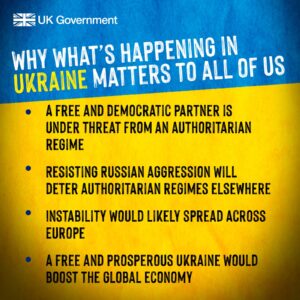 But Ukrainians understand the difference between an imperfect president and the system he bestrides. Mr Zelensky’s statements are “irritating for us, he may be irritating for the West,” says Oleksiy Haran, a political scientist at the Kyiv-Mohyla Academy. “But that is what goddamn democracy is about.” If war comes, it is Ukraine’s democracy, messy as it is, that will be at stake.
But Ukrainians understand the difference between an imperfect president and the system he bestrides. Mr Zelensky’s statements are “irritating for us, he may be irritating for the West,” says Oleksiy Haran, a political scientist at the Kyiv-Mohyla Academy. “But that is what goddamn democracy is about.” If war comes, it is Ukraine’s democracy, messy as it is, that will be at stake.
U.S. Embassy Kyiv Chargé d’Affaires Kristina Kvien today signed a Memorandum of Understanding with the governments of the UK, Canada, Sweden, and Switzerland to launch a new Partnership Fund for a Resilient Ukraine, USAID reports. The U.S. plans to contribute up to $10 million over three years to bolster the resilience of communities in eastern Ukraine in the face of Russia’s aggression.
Putin’s ‘desire to stop time’
Putin could “prolong the crisis and see if better opportunities arise than a short-term quick kill, which does not seem to be working out for him,” said Daniel Fried, a distinguished fellow at the Atlantic Council and former U.S. ambassador to Poland.
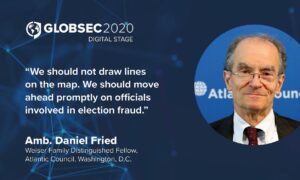 But his overall political objectives in Ukraine would likely stay constant, he told Foreign Policy “His strategy remains the same: destroy Ukrainian sovereignty and independence,” said Fried, a National Endowment for Democracy (NED) board member. “He’s not going to give up what he wants, but he may change the tactics.”
But his overall political objectives in Ukraine would likely stay constant, he told Foreign Policy “His strategy remains the same: destroy Ukrainian sovereignty and independence,” said Fried, a National Endowment for Democracy (NED) board member. “He’s not going to give up what he wants, but he may change the tactics.”
In Putin’s vision, “if the authorities do not solve this security problem now, then Ukraine will be in NATO in 10-15 years” according to analyst Alexei Makarkin. What drives Putin “is the desire to stop time,” he told AFP.
It is imperative to support Ukraine not only because it meets national security interests, said Marie Yovanovitch, a former US ambassador to Kyiv. “It is the smart thing to do and it is the right thing to do. It reflects who we are as Americans, as a democracy supporting another democracy in the face of an authoritarian and increasingly aggressive atmosphere.”
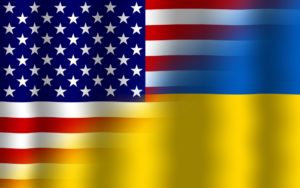 “It is not just a matter of Russia,” she noted, joining a delegation to Kyiv organized by the Atlantic Council, and the Yalta European Strategy and Victor Pinchuk Foundation. “If we don’t support Ukraine now, we can expect to see a lot more aggression elsewhere. Many other authoritarian regimes are watching and weighing up the West’s response.”
“It is not just a matter of Russia,” she noted, joining a delegation to Kyiv organized by the Atlantic Council, and the Yalta European Strategy and Victor Pinchuk Foundation. “If we don’t support Ukraine now, we can expect to see a lot more aggression elsewhere. Many other authoritarian regimes are watching and weighing up the West’s response.”
China’s leaders have watched the confrontation between Russia and the United States over Ukraine intently, with reports in Chinese state media highlighting the divisions among the NATO allies and criticizing the United States, gleefully at times, The New York Times reports.
“If there’s a war over Ukraine, and the Chinese and Russians overtly align with one another, suddenly the world we’re in looks like a very, very different one,” said Evan S. Medeiros, a professor at Georgetown University who served on the National Security Council during Russia’s annexation of Crimea from Ukraine in 2014. “China will be on the eastern front of what looks like a long-term global competition,” he added.
Autocratic solidarity
“In practical terms, China benefits on two fronts,” said Alexander Gabuev, an expert on Russia’s relations with China at the Carnegie Moscow Center. “First, a major security crisis in Europe will suck up a lot of oxygen that Team Biden needs to address China. Secondly, Russia will move even closer to China — on Beijing’s terms.”
 Maria Snegovaya, who co-wrote an Atlantic Council paper on American sanctions against Russia, predicted that China would help blunt the impact of sanctions, noting that the country is now a big buyer of Russian weapons, fish and timber, and in 2020 it was the largest importer of Russia’s crude oil and natural gas.
Maria Snegovaya, who co-wrote an Atlantic Council paper on American sanctions against Russia, predicted that China would help blunt the impact of sanctions, noting that the country is now a big buyer of Russian weapons, fish and timber, and in 2020 it was the largest importer of Russia’s crude oil and natural gas.
“This provides Russia more flexibility in case the West sanctions some of Russia’s exports,” said Snegovaya, a former NED Penn Kemble fellow.
“We have reached a moment to either support authentic legal principles or risk losing them altogether,” the University of Notre Dame’s Mary Ellen O’Connell warned in a blog post for the European Journal of International Law.
“The Russia-Ukraine crisis debate is being waged using legal concepts of statehood and principles governing the use of force and countermeasures,” said O’Connell, author of The Crisis in Ukraine—2014. “We rarely hear mention of the other critically relevant area of law, the principles and procedures of international dispute resolution. Yet, those are the only game in town for this dispute.”
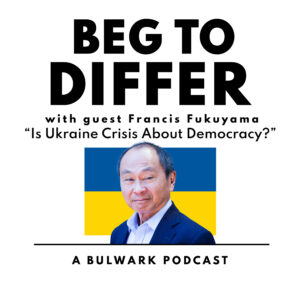 Is the Ukraine crisis really about democracy? asks Stanford’s Francis Fukuyama.
Is the Ukraine crisis really about democracy? asks Stanford’s Francis Fukuyama.
European institutional weakness, desired and maintained by individual member states, means that the current crisis, while centered on Europe, is “in fact managed mostly by the United States and NATO,” experts told AP.
“The European Union is sidelined by the initiative of France and Germany in the perennial struggle for European leadership,” according to Dr. Stefano Vernole, Director of CeSEM / Eurasia. Sen. Luigi Marino ascribes European division to “the three types of pro-European states: Radical Atlanticists (Baltics, Poland, etc.), Autonomists (France) and Pragmatics (Italy), therefore it counts how one acts in the Alliance and how far one must always say yes.”
A cold war framing of the Ukraine crisis undermines, imperceptibly perhaps, democratic legitimacy in the whole region. Thinking in terms of spheres of influence takes us back to a time when the Soviet Union’s satellite countries were unable to freely decide which military alliance or political regime they aspired to belong to, note Journal of Democracy contributors Karolina Wigura and Jarosław Kuisz of the Kultura Liberalna Foundation.*
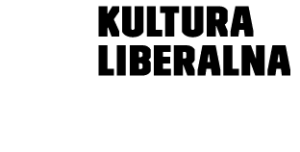 What should be remembered today is that, during the Euromaidan crisis in 2013 and 2014, there were Ukrainians ready to sacrifice their lives to join Europe. The EU and Nato were founded to prevent history from repeating itself: if the west is really committed to democratic values, it should defend Ukraine, they write for The Guardian:
What should be remembered today is that, during the Euromaidan crisis in 2013 and 2014, there were Ukrainians ready to sacrifice their lives to join Europe. The EU and Nato were founded to prevent history from repeating itself: if the west is really committed to democratic values, it should defend Ukraine, they write for The Guardian:
But any western decision will have far-reaching consequences for Europe. Further geopolitical instability would affect central and eastern Europe militarily, economically and in terms of migration. There is also a risk that this geopolitical distress could reinforce the region’s turn towards nationalism. Fear, as Cardinal de Retz famously remarked, is the passion that weakens judgment most. The fate of Europe will be decided in Ukraine.
The Ukrainian people have shown more than once they will have the last word on their future, @cepa analyst @olgatokariuk writes for @washingtonpost https://t.co/L3fPG9SQgb
— Democracy Digest (@demdigest) February 2, 2022
Displaying the double standards that have characterized western Europe’s approach to eastern Europe for centuries, people who would be totally outraged by the notion that Poland could have a veto over what alliance Germany should join, or Britain over France, are quite happy to give Russia a veto over Ukraine’s alliance choices, Oxford University’s Timothy Garton Ash contends.
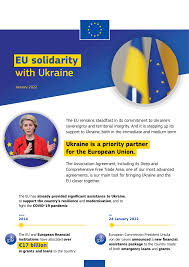 Essentially, the west – if one can still talk of a single geopolitical west – has spent the years since 2008 failing to decide between two different models of order in Eurasia, instead pursuing a bit of both and neither properly. We can call these models, in shorthand, Helsinki and Yalta, he writes for The Guardian:
Essentially, the west – if one can still talk of a single geopolitical west – has spent the years since 2008 failing to decide between two different models of order in Eurasia, instead pursuing a bit of both and neither properly. We can call these models, in shorthand, Helsinki and Yalta, he writes for The Guardian:
- On paper, everyone in the west subscribes to the Helsinki model – a Europe of equal, sovereign, independent democratic states, respecting the rule of law and committed to resolving all disputes by peaceful means….More inspiringly, the goal is summed up in the words that Harvey Sicherman, a now-forgotten American diplomat, wrote into a speech by President George HW Bush: “Europe whole and free … and at peace”.
- The February 1945 summit between Joseph Stalin, Franklin D Roosevelt and Winston Churchill at Yalta in (oh, irony of history) Crimea has become a synonym for great powers carving Europe up into western and eastern spheres of influence. Russia’s recent maximalist treaty proposals amount to what Russian analysts have actually called “Yalta 2”. Only a few outspoken soi-disant “realists” in the west explicitly endorse this model, but many more effectively subscribe to some version of accepting spheres of influence.
“The European Parliament expects Ukraine to continue its reforms, thereby implementing the Association Agreement,” said Radosław Sikorski MEP (right, center), Chair of the EP Delegation for Relations with the US. “Such a development is what Putin fears most: a democratic European Ukraine, increasingly stable and prosperous, would also be an inspiration for the Russian people.”
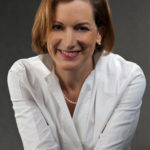 The Ukraine Crises: What Should Biden Do?
The Ukraine Crises: What Should Biden Do?
The International Studies Leadership Council hosts an urgent discussion of the growing crisis in Ukraine and how the U.S. should respond with Pulitzer-prize-winning historian Anne Applebaum (right), a staff writer for The Atlantic and National Endowment for Democracy (NED) board member. Feb 3. 5 – 6:15pm EST Attend by using this Zoom link.
*Karolina Wigura is a historian of ideas, board member of the Kultura Liberalna Foundation in Warsaw and a fellow at the Robert Bosch Academy in Berlin. Jarosław Kuisz is a political analyst and essayist, editor-in-chief of the Polish weekly Kultura Liberalna and a policy fellow at the University of Cambridge.
Why Ukraine’s success is in the US national interest. Feb 4 20202 (above).
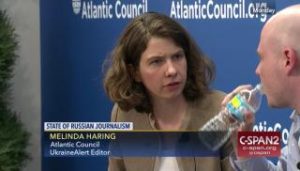
C-Span
Representative Brian Fitzpatrick (R-PA) and Representative Marcy Kaptur (D-OH) provide opening remarks on US support for Ukraine, before Melinda Haring, deputy director of the Atlantic Council’s Eurasia Center, moderates a conversation with Ambassador John Herbst, senior director at the Atlantic Council’s Eurasia Center; Dr. Leon Aron, senior fellow at the American Enterprise Institute; Herman Pirchner, Jr., president of the American Foreign Policy Council; Dr. Alina Polyakova, president and CEO of the Center for European Policy Analysis; Dr. Andrea Kendall-Taylor, senior fellow and director of the Transatlantic Security Program at the Center for a New American Security; Jonathan Katz, senior fellow and director of Democracy Initiatives at the German Marshall Fund; Dr. Emily Channell-Justice, director of the Temerty Contemporary Ukraine Program at Harvard University’s Ukrainian Research Institute; Luke Coffey, director of the Douglas and Sarah Allison Center for Foreign Policy at the Heritage Foundation; Glen Howard, president of the Jamestown Foundation; Admiral (Ret.) James G. Foggo, dean of the Center for Maritime Strategy at the Navy League of the United States; and Dr. Donald Jensen, director for Russia and Europe at the US Institute of Peace.
@USAIDDRG joins multi-donor coalition to launch new Partnership Fund for #resilientdemocracy in Ukraine, @USAID reports #UkraineCrisis #UkraineConflict | https://t.co/F1wd7KF8lc https://t.co/F1wd7KF8lc
— Democracy Digest (@demdigest) February 2, 2022







